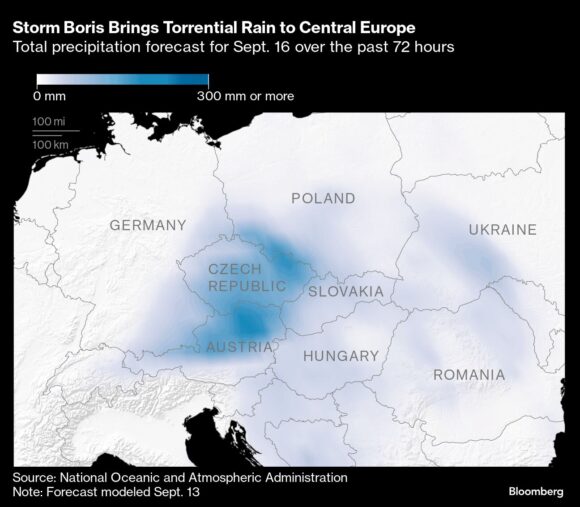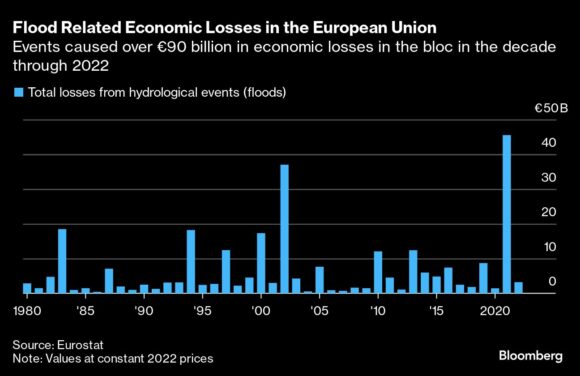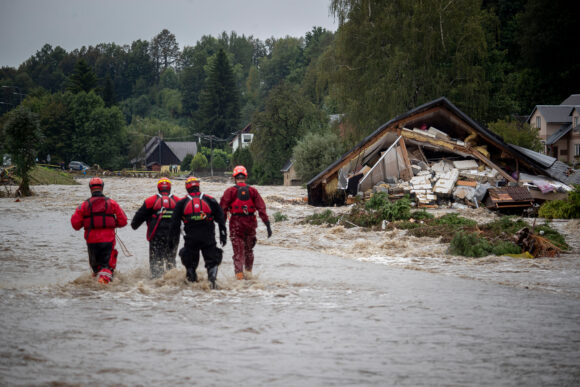Floods ripped through central Europe killing at least 17 people, as governments across the region took emergency measures and prepared to spend hundreds of millions of euros on the cleanup.
Flows in the Danube — Europe’s second-longest river — were at levels statistically likely only once every 85 years, after Storm Boris dumped torrential rain on Austria, the Czech Republic, Poland and Hungary. Red weather alerts remain in place, with thousands of people already evacuated over the weekend.
After a summer of heat waves across southern Europe, the destructive storm — mixing cold air from the north with moisture drawn from the warm waters of the Mediterranean — may be another sign that climate change is increasing the intensity and frequency of extreme weather events. It’s also forcing governments to set aside scarce funds to rebuild.

Polish Prime Minister Donald Tusk is channeling 1 billion zloty ($260 million) to flood-affected areas, as well as appealing to the European Union for financial help. The Czech government may amend its 2024 budget because of the flood-related damages, according to Finance Minister Zbynek Stanjura.
Austria has freed up €300 million ($334 million) in emergency budget reserves, while Romania is allocating an initial 100 million lei ($20 million) to those affected.
Flooding in Central Europe Could Cause Billions in Economic Losses, Analysts Say
The Polish government announced a state of emergency in some regions on Monday, while a similar declaration was made in Lower Austria on Saturday. Romania is poised to declare a state of alert in the two counties hit hardest by the floods, as it looks to speed repairs to houses, bridges and infrastructure.
In Poland, the mayor of Nysa has ordered the town to be evacuated as the floods threaten to overwhelm an embankment, potentially putting thousands at risk. Authorities are also monitoring the rising waters in the Czech city of Ostrava and in the nation’s south.
Still, Czech politicians decided to proceed with elections set for Friday and Saturday in which a third of Senate seats are being contested. Austrian politicians canceled campaign events in the run-up to Sept. 29 elections.
Poland’s biggest insurer PZU slumped after reporting more than 3,000 weather-related claims over the past two days, or nearly nine times more than on a typical weekend. That could curb PZU’s profit by 10%, according to Ipopema brokerage estimates. Austrian insurers Uniqa and Vienna Insurance Group also declined.
The slow-moving cold weather system also brought over a meter of snow to parts of the eastern Alps, with more forecast this week. That’s a stark contrast to the challenge faced in northern Portugal, where more than 500 firefighters are battling wildfires, as temperatures reach a high of 31C (88F) on Monday.
Analysis by scientists at ClimaMeter — a project funded by the EU and French National Centre for Scientific Research — found that climate change means that depressions like Storm Boris have become 20% more intense in the past two decades compared with the preceding 22 years.
“These are not just isolated natural disasters,” Davide Faranda of CNRS France said in an email. “Research shows that extreme rainfall is becoming more frequent and intense due to man-made climate change.”
Firefighters in a flooded street in Jesenik, Czech Republic, on Sept. 15. Photographer: Gabriel Kuchta/Getty Images
Hungary is bracing for its worst flooding in more than a decade, with Budapest on the highest alert. More than a million sandbags will be deployed along the Danube in the capital, while roads along the river will be closed this evening.
Hungarian Prime Minister Viktor Orban, whose government holds the European Union’s rotating presidency, canceled all international engagements, according to a post on X. Orban was due to present the presidency’s priorities to the European Parliament in Strasbourg, France on Wednesday.
Cross-border trains have been halted to neighboring Austria, where many intercity rail services have been canceled around Vienna. The national rail operator has advised against any unnecessary travel until Tuesday evening.
Water flows on the Danube in Korneuburg, just upstream from Vienna, peaked early on Monday at 10,300 cubic meters per second. That’s a once-in-85-years volume.
Kofola CeskoSlovensko, a Czech-based drinks maker, was forced to suspend production at its key plant in Krnov. The company, which has more than 2,800 employees, said it would cope as it had after major floods 27 years ago.
“The water level in Krnov was higher this time than in the dramatic year of 1997, when my father and I sat on the roof of our production hall,” Kofola co-founder and Chief Executive Officers Jannis Samaras said in a statement on Monday. “Tomorrow we’ll start with the cleanup.”
Germany has experienced some flooding in Saxony and Bavaria, with water levels continuing to rise. German Economy Minister Robert Habeck said it underlined the need to accelerate the transition to renewable energy, according to comments cited on Monday by the Funke media group
“We should be clear about the cause: increasingly frequent floods, disasters like in the Ahr Valley, this year in Bavaria — they are a consequence of the climate crisis,” Habeck said. “We must prepare for more extreme weather events and take precautions.”

Flood Impacts:
Poland:
- In Poland, four fatalities were reported as more than 3,000 people were forced to evacuate.
- While water levels are receding in highland areas, cities including Wroclaw are now threatened.
- Poland has suspended cross-border rail services to the Czech Republic and closed several roads.
Czech Republic:
- In the Czech Republic, about 13,500 people were evacuated from their homes and over 80,000 households remain without electricity. Three people died, with another seven still missing, according to Prime Minister Petr Fiala.
Austria:
- In Lower Austria, two elderly people died after being trapped in their flooded homes, news service ORF reported, citing a police spokesperson.
- In Vienna, four out of five metro lines are operating shortened services.
Hungary:
- Thousands of volunteers are expected to join as many as 17,000 soldiers helping with flood-defense work, according to Interior Minister Sandor Pinter. Water levels are only projected to peak later this week.
Romania:
- The flooding could further curb Romania’s already drought-hit corn crop, according to a farmers’ body.
Serbia:
- Serbia is bracing for a possible flood wave from the Danube later in the week.
Photograph: Firefighters in a flooded street in Jesenik, Czech Republic, on Sept. 15, 2024. Photo credit: Gabriel Kuchta/Getty Images
Was this article valuable?
Here are more articles you may enjoy.



 AIG’s Zaffino: Outcomes From AI Use Went From ‘Aspirational’ to ‘Beyond Expectations’
AIG’s Zaffino: Outcomes From AI Use Went From ‘Aspirational’ to ‘Beyond Expectations’  Portugal Deadly Floods Force Evacuations, Collapse Main Highway
Portugal Deadly Floods Force Evacuations, Collapse Main Highway  Florida Insurance Costs 14.5% Lower Than Without Reforms, Report Finds
Florida Insurance Costs 14.5% Lower Than Without Reforms, Report Finds  Trump’s Repeal of Climate Rule Opens a ‘New Front’ for Litigation
Trump’s Repeal of Climate Rule Opens a ‘New Front’ for Litigation 

